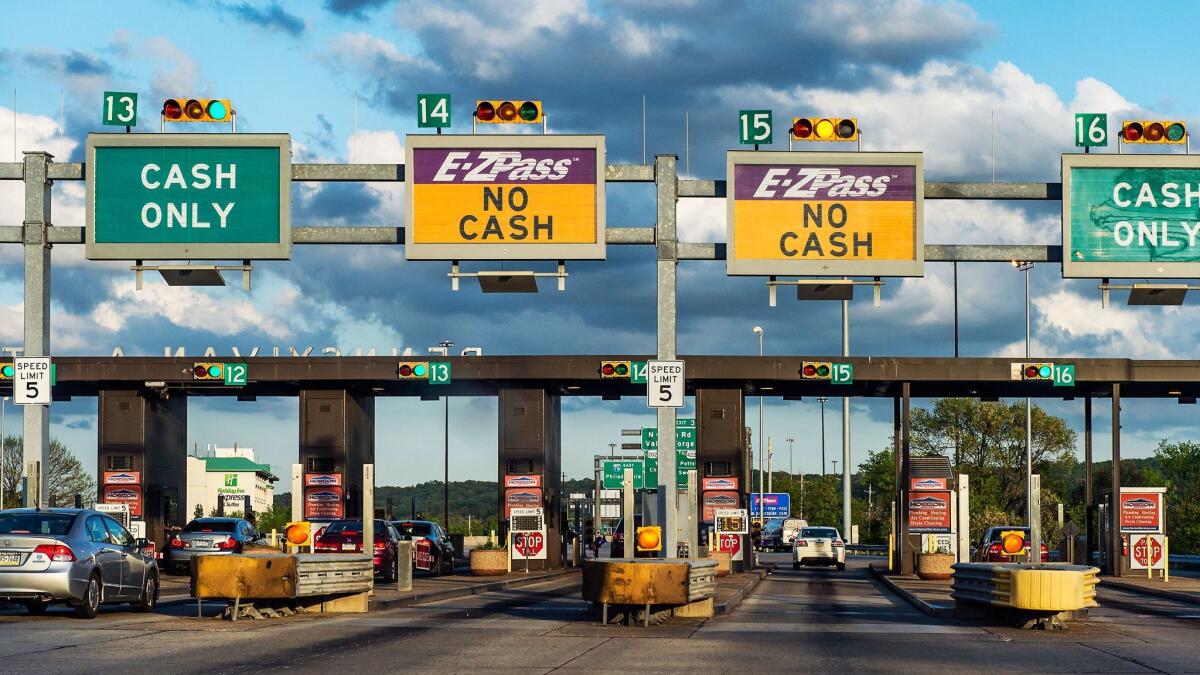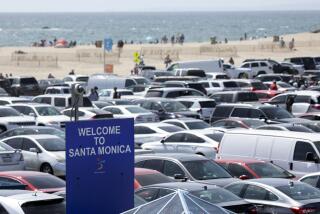Why your rental car might cost you a whole lot more than you thought it would

Question: I recently rented a car at the airport in Albany, N.Y. It came with a toll device. I did not want to use it; I wanted to pay at the booth. And I did except for one time when the device flipped open by itself. When I went to pay at the booth, the attendant told me I had already paid. I taped the device closed. When I told the car rental rep about the problem, he told me the device belonged to a third party, not to the rental car agency. What is the consumer supposed to do?
Ahmed Rafi
Lakewood
Answer: Take a bus or a train or use a ride-share service. Take your own transponder. Drive on back roads. Dispute the charge with your credit card company. Carry cash. And donât travel the Golden Gate Bridge in a Hertz rental.
When you rent a car, you enter another dimension weâll call the Toll Road Zone.
The zone is growing. As of January 2015 there were 5,882 miles of U.S. tollways (which include roads, bridges and tunnels), an increase of 1,161 miles in a decade, according to a report by the International Bridge, Tunnel and Turnpike Assn.
Thatâs less than 1% of our national highways, but it may seem as though thatâs all youâre driving on in the nearly three dozen states that have such roads. Which state is the tollway leader differs depending on which stats you look at, but New York ranks near the top of the list. (So do Florida, New Jersey, Oklahoma and Delaware.)
In the olden days, you carried a wad of cash and coins, but today many tolls are collected electronically.
Depending on your level of cynicism, you may feel helped by rental car agencies that let you use their e-device to collect tolls, or you may feel cheated because you didnât realize you could be charged a convenience fee (generally starting at about $3.95) each day you used the e-pass or, worse, for each day of your trip.
You may not, for instance, have wanted to use the car companyâs e-device, but on that one occasion when you didnât have the money, it charged your rental car-equipped device, then made the fee retroactive to the beginning of your trip and charged you every day you had the car, not every day you used the e-pay option.
Hereâs where consumers must be aware of because itâs confusing: Not every company plays by the same rules even if the rental car agencies are under the same corporate umbrella.
Hertz, Dollar and Thrifty are affiliated but their rules are different, Hertz said in an email:
âHertzâs PlatePass service costs $4.95 for each day of the rental plus the cost of each incurred toll. There is an administrative fee cap of $24.75 per rental agreement.
âDollar and Thrifty PlatePass is all-inclusive â meaning [the renter] pays one flat daily or weekly rate, which includes the cash price of tolls incurred, regardless of the number of tolls incurred.â
The Enterprise, National and Alamo groups âcharge only for the days a customer incurs a toll, not to exceed $19.75 per rental period plus all incurred toll charges,â Enterprise said in an email.
Avis and Budget, also sister companies, have similar language for their rules on their websites. Hereâs Budgetâs version: âIf you do not pay cash for tolls, you automatically opt into our e-Toll service. ⌠Under the e-Toll program, once you pass through an electronic toll, you will be charged a convenience fee of $3.95 a day for each day of the entire rental period, including any days on which e-Toll is not used, up to a maximum of $19.75 a month.â
Both sites also say âplus incurred tolls at the maximum prevailing rates posted by the toll authority.â This means that if tolls fluctuate depending on when you drive (rush hour more, wee hours less) youâll be paying the rush-hour rate.
Your hackles may now be raised and you may be thinking, âIâll just carry cash and Iâll pay for this out of my own pocket and to heck with them and their convenience fee and making me pay the max toll when I should be paying the minimum.â
OK. You usually can opt out. But hereâs the problem: There is sometimes no option to pay in cash; itâs all e-collected.
The Golden Gate Bridge is one such place. Maybe just this once you decide to use the auto-toll-device. But if youâre in a Hertz car, the rules say this: âHertz customers who do not have their own transponder or do not pay with cash will be treated as having opted in to the PlatePass service when going through a toll booth and will be responsible for resulting tolls and PlatePass convenience fees.â
In other words, you have no choice but to use the Hertz device.
That didnât sit well with the good people of San Francisco, where City Atty. Dennis Herrera filed a suit against Hertz in March on behalf of Californians, saying, âCustomers neither choose the service nor receive sufficient notice to avoid it. They neither receive its supposed benefits nor consent to its charges.
âInstead, by simply driving over the Golden Gate Bridge a single time, as millions of tourists do each year, each Hertz customer is charged not only the undiscounted toll rate but up to $24.75 in extra fees.â
Part of the pique is based on this: If you donât have PlatePass, you can pay before you go across the bridge or after âin person, online, by phone or by mail,â the suit notes. You donât get that option with PlatePass.
The suit is pending.
Until then, you can follow the suggestions in the first paragraph. But if youâre Rafi, you will need to contact the rental car agency. If you receive no relief from the agency, you will need to file a dispute with your credit card company.
From a renterâs perspective, it may seem as though youâre being gouged (and you are if you didnât open the transponder). But from rental car companiesâ perspective, they also are gouged by renters who blow through toll booths without paying, said Chris Brown, executive editor of Auto Rental News, an industry publication.
In the end the relief could be legislative, Brown said, although that brings with it the issue of badly written laws. But clear disclosure by the rental company may be the better option, he said.
Brown may be right. Youâll pay a toll one way or the other. Somehow, though, it just feels better if you know where the bill is coming from.
Have a travel dilemma or question? Write to travel @latimes.com. We regret we cannot answer every inquiry.
ALSO
New hotels mean Palm Springs is once again the capital of cool
The Mediterranean island of Menorca feeds body and soul
How to save big on Hawaii Island
More to Read
Sign up for The Wild
Weâll help you find the best places to hike, bike and run, as well as the perfect silent spots for meditation and yoga.
You may occasionally receive promotional content from the Los Angeles Times.







